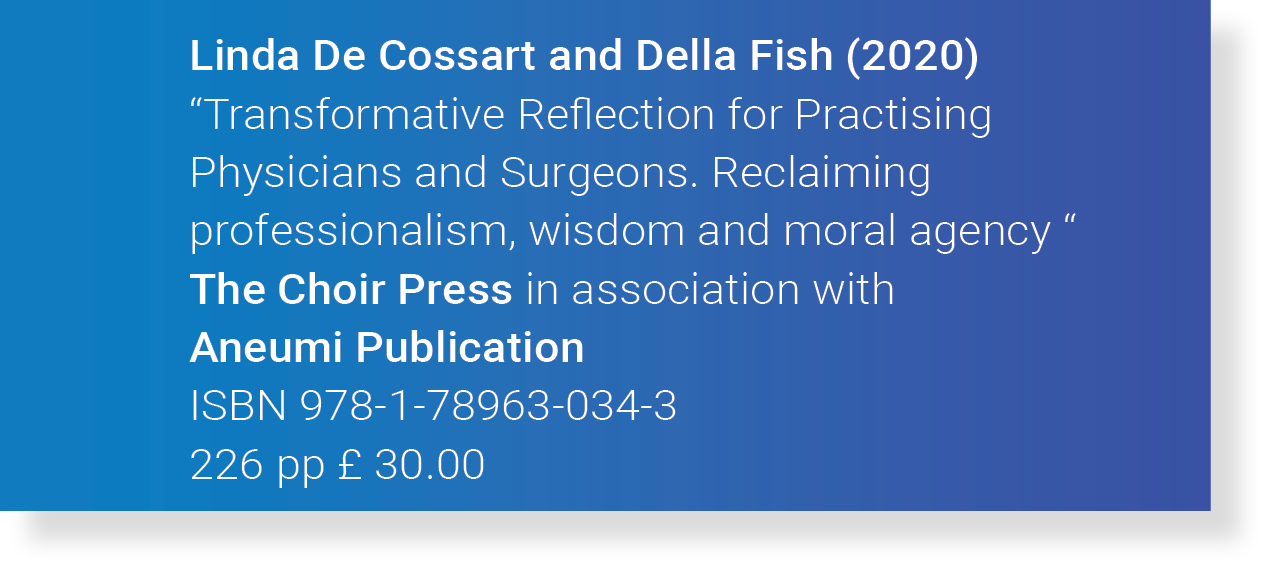

Although Reflective Practice is now accepted to be part of Medical Education, its implementation is variable and guidance as to how this should be carried out in practice is virtually absent. This latest book by De Cossart and Fish therefore is timely.
Unlike other publications in the field of Medical Education which are mostly examination oriented and in the main concerned with what is known as “behavioural objectives”, this volume makes the case for an entirely different approach based on Reflection.
The book is aimed directly at practising clinicians, and although the content mostly seems to have the surgeon in mind, it is of immediate practical application regardless of any particular medical Specialty.
De Cossart and Fish are leading authorities in the field of Medical Education and need no introduction. Readers will be familiar with their previous titles
(De Cossart and Fish 2005; Fish and De Cossart 2007).
The book looks at the theory and practice of Medical Education today and the Authors advance a view of education which is not at all didactic or formal but essentially constructivist1.
The book is divided into four parts subdivided into chapters. The chapters are thoroughly referenced and there are useful tables and check lists. Each chapter has Summaries and diagrams.
There is a demonstration of what they call the Transformative Reflective Process (TRP) based on a real case, which is provided as an Appendix. Case material used in this way is rarely found elsewhere.
As in their work previously, the book draws attention, with examples, to the many opportunities for teaching and learning that are available in the clinical settings also further advancing the distinction between Education, an essentially moral occupation2 and Training which is aimed at learning skills. At the same time, and contrary to the prevailing view, they place Education squarely in the clinical settings3.
The distinction is of fundamental importance philosophically and of course the idea of education as a moral occupation sits opposite to the concept of “learning styles”.
It is also clear from this book that the Authors believe that the practice of reflection needs to be systematic in order to be effective or to borrow their own language, truly “transformative“. It cannot be incidental or casual.
The book addresses matters organically always starting with First Principles and then looking at existing practice to finally provide a critique. Opinions are based on research findings, which are always credited and often original. This scholarly approach will be familiar to devotees and is instantly recognizable. The Authors speak with conviction and in a style which is characteristically forthright though never moralistic or prescriptive.
In the exam orientated literature of today Reflective Practitioners have been criticised for being ineffective and it is certainly the case that in the not-too-distant past “real” teaching was deemed to be able to only take place in the classroom, the clinical settings being thought to be only of secondary importance4.
It is not surprising therefore that in this book possibly their most philosophical to date. The Authors should take issue with the Academy of the Medical Royal Colleges and the GMC for failing to be fully committed to practice-based learning in their guidelines and being still far too theoretical.
I have personally found, speaking as a Psychiatrist and an Educator, that in the Curricula and in many rotational training schemes, Reflective Practice is regarded as an adjunct and proposed simply as an “add on” that is to say added to old fashioned didactic teaching, which it does not seek to replace, which I find very artificial. I suspect this to be a hangover from the traditional Teaching Hospital (Heaman, 2022) and true both of the clinical settings and of the Regional Courses.
It is also very clear from this book, that for De Cossart and Fish the practice of education always starts at the level of the Learner and never the other way round, a point of fundamental importance generally but especially important when working in the clinical settings, for example when working with underachievers.
Although very academic, the book always engages the reader very readily and concepts that for many are still esoteric such as “Reflection in Action” and “Reflection on Action” (Schon, 1983) readily come to life and are easily accessible.
I also personally enjoyed their critique of the widespread use of technology, and especially online training, which in this book is stated to be excessive and “de-humanising”, a point which is critical in a post COVID environment.
The intention of this book as they also say in the introduction, is to assist professionals and the professions, to reclaim their own practice and the reader is never left in any doubt that for the Authors Reflective Practice is the only practice which is of any value in a clinical setting.
The book has much to offer to those who work in a mediocolegal setting, possibly the clinical setting
"par excellence", where despite the many excellent courses available the practice of education is to this day still very classroom based5.
The book therefore provides significant
added value.
One only has to remember that teaching in the clinical settings, including reflection, was only accepted relatively recently and only because of the introduction of the European Working Time Directive (EWTD) into UK law, thereby limiting the time spent by trainees on the wards, but was otherwise met with scepticism if not downright hostility (KSS Deanery.
Liberating Learning, 2007).
This is of course a far cry from the Vygotskyan imperative requiring a teacher always to abstain from doing anything even remotely didactic but instead “scaffold“ the learner (Vygotsky, 1978).
My only criticism of this book is that the case material rather than being included in the book as an individual chapter is instead featured as an Appendix, thereby significantly reducing its impact if not entirely undermining the scope of the book. This however is a criticism of form and not of substance.
Although difficult in places for the uninitiated, this book will readily appeal to anyone seeking to update themselves with regard to the practice of Medical Education. The book is highly recommended.
Footnotes:
[1]The constructivist view of Education believes knowledge to be something that cannot be transmitted but is always constructed by the learner
[2] The definition of education as an essentially moral practice, has a long history which can be traced back to the ancient Greeks. It holds that Education is the natural extension of “phronesis”, the moral virtue.
[3] The safe place where knowledge is constructed through experience is known as the "practicum" (De Cossart and Fish 2005).
[4] Didactic teaching in Medical Education was until recently still highly prevalent, the clinical settings being regarded as merely a place suitable for the application of knowledge gained in the classroom.
[5] In the medicolegal setting resistance to practice-based teaching and learning, including Supervision, continues to this day to be almost intractable, the only clinical teaching available to aspiring Experts being limited to what is available in the Judges’ comments on their reports, often not very favourable.
References:
[1] De Cossart L and Fish D (2005) “Cultivating the Thinking Surgeon: New Perspectives on Clinical Teaching, Learning and Assessment“ TFM Publishing LTD
[2] Fish D and De Cossart L (2007) “Developing a Wise Doctor: A resource for trainers and trainees in MMC“ CRC Press
[3] Heaman E A (2002) ”St Mary’s. The History of the London teaching Hospital” McGuill-Queen's University Press
[4] KSS Deanery (2007) “Liberating learning. A practical Guide for learners and teachers in postgraduate medical Education and the European Working Time Directive. The Report of the Conference of Postgraduate medical Deans ad hoc Working Group on the Educational implications of the European Union Working Time Directive”.
[5] Schon D (1983)” The Reflective Practitioner. How Professionals think in Action “ Hachette Books Group
[6] Vygotsky L (1978) “Mind in Society. Development of Higher Psychological Processes” Harvard University Press
.jpg)